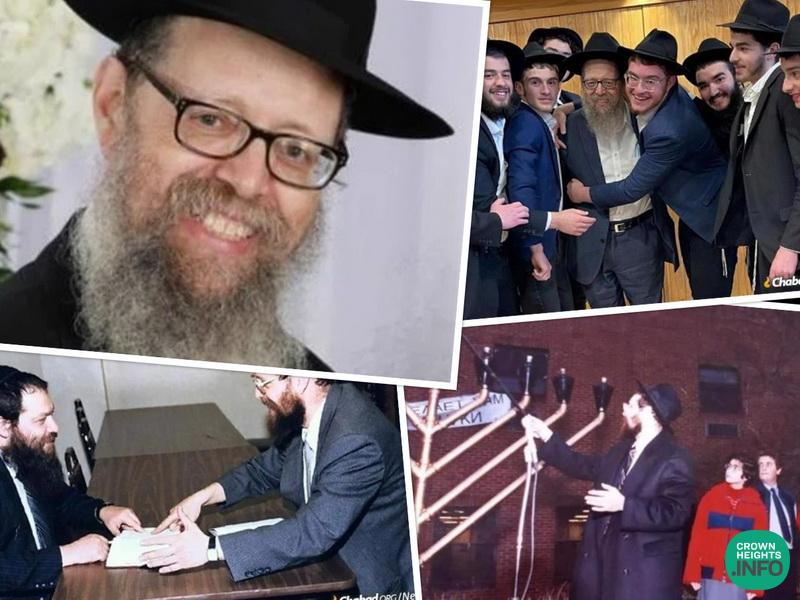
Rabbi Yosef Itkin, 69, Teacher Known as ‘Lamplighter of Pittsburgh’
by Nancy K. S. Hochman – chabad.org
Rabbi Yosef Yitzchok Itkin, an acclaimed teacher, mashpia (Chassidic mentor) and kashrut executive who brought his tireless enthusiasm for Torah study and Chassidic philosophy and customs to the Pittsburgh Jewish community for more than 40 years, passed away on 7 Tevet (December 18). He was 69 years old.
Known affectionately as “Fitche,” Itkin moved to Pittsburgh in 1981 with his wife, Nechama, and was known for sharing his joy for Judaism with all, greeting everyone with respect and love.
Having grown up in Brooklyn, two doors away from Chabad-Lubavitch world headquarters in Crown Heights, Itkin was a devoted Chassid of the Rebbe, Rabbi Menachem M. Schneerson, of righteous memory. He would catch rides on the six-to-seven-hour drive to Crown Heights whenever he could, especially when word spread that the Rebbe was holding an impromptu farbrengen or was giving out Chassidic discourses, often encouraging those who had never been in the Rebbe’s presence to join him.
“My father was the ideal Chassid,” said Shaina Stolik, co-director of Chabad of South Palm Beach, Fla, one of Itkin’s nine daughters. “He never grew angry or bitter. He always accepted everything and everyone with love.” One woman whom Itkin helped told Stolik, “Your dad was my insurance policy,” in recognition of the comfort he provided and the lengths he would go to help. “My father believed whatever you can give yourself, you can give to someone else,” said Stolik, who has come to view her father as “the great uplifter.”
Rabbi Yisrael Altein, director of Chabad of Squirrel Hill in Pittsburgh, and a friend and colleague of Itkin, said that “regardless of his environment, Rabbi Itkin consistently embodied the essence of a Chassid in his care and love for every person. Everyone who interacted with him benefitted from his genuine warmth and welcoming smile.”

Dedicated Teacher and Kosher Supervisor
That warmth was experienced by generations of yeshivah students taught and guided by Itkin over more than four decades. Itkin taught Chassidic philosophy, Talmud, and halachah (Jewish law) at the Yeshiva Schools of Pittsburgh, and his students remembered him as having joyously uplifted them with his love and deep respect for each student.
Rabbi Yirmi Cohen, rabbi of Congregation Oholei Yoseph Yitzchak in Toronto who was a student of Itkin at the Yeshiva Schools of Pittsburgh between 1986 to 1988, attests to the love and high regard of the students who were privy to Rabbi Itkin’s sincerity, authenticity and constant willingness to help. Cohen considers Itkin “a mentor of tremendous depth” and a personal friend. “I would reach out to Rabbi Itkin years after graduation to share a story I heard about the Rebbe, or ask him to clarify a Chassidic idea with his keen scholarship and insight.”
Cohen also attested to Itkin’s ability to uplift each of his students with his genuine warmth and authentic love. Cohen recalls calling one day to offer his condolences to Itkin upon the loss of a relative. “Avraham Boruch, one of Itkin’s sons, asked who was calling, and I replied, a tongue-in-cheek, that it was ‘the Rabbi’s favorite student.’ ‘He has many favorite students.’ Avram Boruch told me. I realized then how so many students, like myself, felt the beauty of his words, and the authentic way he made each of us feel special.”

Itkin wore other hats just as joyously. As kosher supervisor for the Vaad HaRabonim of Pittsburgh, his role was more a labor of love than a job, said family and friends. Jewish residents who observed the highest levels of kashrut felt reassured that establishments under Itkin’s watch were held to the highest standards of kosher.
In fact, when it came to kashrut, said Altein, Itkin took very much to heart Chassidic teachings about the relevance of kosher not only to the body, but to the Jewish neshamah (soul). The importance of kashrut, the Chassidic masters teach, is that each item of food ingested becomes part of a person’s flesh and blood, which is connected to their neshamah. “Rabbi Itkin took that very seriously,” said Altein.

Lamplighter of Pittsburgh
Itkin took special pride in his responsibility to maintain the many public menorahs in the Pittsburgh metropolitan area.
Stolik said that lighting the public menorahs in Pittsburgh, some of which required kerosene, was a tiring job that her father also executed with joy. On each of the eight nights of Chanukah, Itkin would drive alone throughout Pittsburgh, lighting each public menorah, including the many erected by the municipality.
When Chabad of Pittsburgh was in the midst of fighting a landmark court battle in the late 1980s over the constitutionality of placing the religious symbol on the steps of the county court building, Itkin further publicized the miracle of Chanukah by affixing a menorah atop his car before going on his rounds and setting up the menorahs.
Besides physically lighting each and every public menorah in Pittsburgh, Stolik said that throughout the year her father was a lamplighter for Jews and non-Jews alike. “My father told all his yeshivah students to make sure they never went anywhere before first preparing a d’var Torah (Torah lesson) to share with the people they met,” she said.
“His mouth was always filled with words of Torah.”
Rabbi Itkin is survived by his wife Mrs. Nechama Itkin (nee Junik) and their 11 children: Chana Mondshine of Smolensk, Russia; Shaina Stolik of South Palm Beach, Fla.; Tzivi Kivman of Mansfield, Mass.; Rabbi Avraham Itkin of Kingston, N.Y.; Rabbi Chaim Itkin of Pittsburgh; Chaya Posner of Toronto, Canada; Alte Raskin of Brooklyn, N.Y.; Goldie Ohana of Binghamton, N.Y.; Rivky Raichik of Los Angeles, Calif.; Leah Itkin and Menucha Itkin; and grandchildren. He is also survived by his siblings Feigie Rapaport of Mequon, Wisc.; Shana Tiechtel of Brooklyn, N.Y.; Rabbi Leibel Itkin of Scranton, Pa.; and Chana Geisinsky of Great Neck, N.Y.










